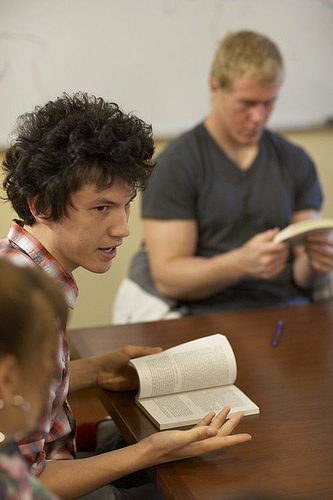As the number of undergraduates increases, the ever-popular course of English Literature finds itself increasingly over-subscribed. How can you make sure you are the ideal candidate?
Image by Columbia Admissions
In recent years, universities have seen a huge boom in terms of the number of annual applicants, especially for the ever-popular course of English Literature (Durham University reports that in 2008-2009 there were 2100 applications for just 103 places). With the huge increase in fees, many young people want to attend the best university they can to make the most of their expenditure. An interest in literature is an evident prerequisite for an English Literature degree, but how else can you make sure you stand the best chance of securing a place?
Choose your A levels wisely
An A level involving English Literature is obviously essential for getting onto a degree course in the same subject. Gaining grounding in how to analyse and critique texts, as well as knowing how to write essays, are essential skills for university level study. Consider, however, choosing a combined course including aspects of language study – it will give you an appreciation of linguistics and a chance to turn your hand to text-production.
Aside from English, potential English Literature students can apply to university with a variety of A level combinations but most do have a focus on the Arts. Popular accompanying subjects include History, Religion or Philosophy (whose theories and ideas more often than not appear in literature), and classical languages such as Latin, which can help you better understand the basic functions and workings of the English Language.
NB: Bear in mind that a lot of universities will not accept General Studies as one of your 3 A levels.
[ALSO READ: How to Get Onto a Photography Degree Course]
Grade requirements
As expected, grade requirements vary depending on the ranking of the university – check on their website for individual stipulations. With more than 2500 courses across the UK, however, offers tend to be high for the best-ranked universities (particularly the well-respected ‘Russell Group’).
AAB/ABB seems to be a pretty average benchmark but institutions such as Oxford, Durham and UCL all ask for at least 3As – with Durham even requiring at least one of the newly introduced A*s.
That perfect Personal Statement
Applying for a place on an English course means you have to demonstrate a ‘unique style’, right? Wrong. Don’t be tempted to do something ‘out-there’ and write your personal statement in poetry form or something equally eccentric – admissions tutors admit that this is a pet hate. Another trap to avoid is making blanket statements such as ‘I have a big passion for literature’ – who doesn’t when applying for an English Literature degree course? Instead, show what particular areas you prefer and why you find them so fascinating (top tip: include some lesser known author references!).
Above all, make sure it is well written – with absolutely no grammar and spelling mistakes. Such errors will not put you in a good position for getting an offer on a course revolving around essay writing… Get a friend or a family member to read it through for you; they may pick up on a mistake you missed.
[ALSO READ: How to Get Onto a Graphic Design Degree Course]
Impressive extra-curricular activities
Showing that you read and write a lot in your spare time is, of course, a bonus when applying for an English course, but equally relevant is a passion for theatre or film – this not only shows an appreciation for other forms of culture but also hints at an interest in how books can be adapted into media. Activities such as debating clubs or an active role in local politics further demonstrate valuable powers of discussion and reasoning – a great essay writing skill.
Lastly, volunteering or working with children (maybe helping them to learn to read or tutoring them in English) always looks impressive; not to mention showing that you want to spread your passion for literature to the next generation!
Applying to university can be stressful but follow these tips and you should be in with the best possible chance of gaining a place. If you can find the time, having writing work experience is always going to impress, so find a website or local paper and see if you can get involved! Best of luck and enjoy your student experience!
Are you a current student of English Literature? What advice could you pass on? Share your comments below!
About Author: Jade is a student going into her final year of study at the University of Leeds. She enjoys blogging on a variety of topics including travel and society for GKBC, who offer online writing work experience for students.



This degree combines elements from our English Language and English Literature degrees in roughly equal proportions, so that you gain skills in both subjects. If you have a passion for literature this course is right for you. Just Saying.